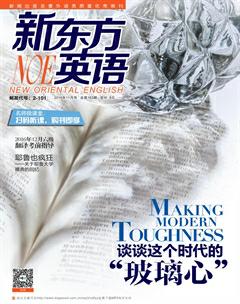谈谈这个时代的“玻璃”心
丁力
When I ask veteran1) college teachers and administrators to describe how college students have changed over the years, I often get an answer like this: “Todays students are more accomplished than past generations, but they are also more emotionally fragile.”
That rings true to me. Todays students are amazing, but they bathe one another in oceans of affirmation and praise, as if buttressing2) one another against some insecurity. Whatever one thinks of the campus protests3), the desire for trigger warnings4) and safe spaces does seem to emanate5) from a place of emotional fragility.
And if you hang around with the middle aged, you hear a common story line to explain the rise of the orchid generation. Once upon a time, the story line goes, kids were raised in a tough environment. They had to do hard manual chores around the house and they got in fights on the playground. Then they went off to do grueling6)work in the factory or they learned toughness and grit7) in the military.
But today, helicopter parents8) protect their children from setbacks and hardship. They supervise every playground conflict, so kids never learn to handle disputes or deal with pain.
Theres a lot of truth to that narrative, but lets not be too nostalgic9) for the past. A lot of what we take to be the toughness of the past was really justcallousness10). There was a greater tendency in years gone by to wall off emotions, to put on a thick skin—for some men to be stone-like and uncommunicative and for some women to be brittle11), brassy12) and untouchable.
And then many people turned to alcohol to help them feel anything at all.
Perhaps its time to rethink toughness or at least detach it from hardness. Being emotionally resilient13) is not some defensive posture. Its not having some armor surrounding you so that nothing can hurt you.
The people we admire for being resilient are not hard; they are ardent14). They have a fervent commitment to some cause, some ideal or some relationship. That higher yearning enables them to withstand setbacks, pain and betrayal.
Such people are, as they say in the martial arts world, strong like water. A blow might sink into them, and when it does they are profoundly affected by it. But they can absorb the blow because its short term while their natural shape is long term.
There are moments when they feel swallowed up by fear. They feel and live in the pain. But they work through it and their ardent yearning is still there, and they return to an altered wholeness.
In this way of thinking, grit, resilience and toughness are not traits that people possess intrinsically15). They are not tools you can possess independently for the sake of themselves. They are means inspired by an end.
John R. Lewis16) may not have been intrinsically tough, but he was tough in the name of civil rights. Mother Teresa17) may not have been intrinsically steadfast, but she was steadfast in the name of God. The people around us may not be remorselessly18) gritty, but they can be that when it comes to protecting their loved ones, when it comes to some dream for their future self.
People are much stronger than they think they are when in pursuit of their telos19), their purpose for living. As Nietzsche put it, “He who has a why to live for can bear almost any how.”
In short, emotional fragility is not only caused by overprotective parenting. Its also caused by anything that makes it harder for people to find their telos. Its caused by the culture of modern psychology, which sometimes tries to talk about psychological traits in isolation from moral purposes. Its caused by the ethos of the modern university, which in the name of “critical thinking” encourages students to be detached and corrosively20) skeptical. Its caused by the status code of modern meritocracy21), which encourages people to pursue success symbols that they dont actually desire.
We are all fragile when we dont know what our purpose is, when we havent thrown ourselves with abandon into a social role, when we havent committed ourselves to certain people, when we feel like a swimmer in an ocean with no edge.
If you really want people to be tough, make them idealistic for some cause, make them tender for some other person, make them committed to some worldview that puts todays temporary pain in the context of a larger hope.
Emotional fragility seems like a psychological problem, but it has only a philosophical answer. People are really tough only after they have taken a leap of faith for some truth or mission or love. Once theyve done that they can withstand a lot.
We live in an age when its considered sophisticated to be disenchanted22). But people who are enchanted are the real tough cookies23).
这些年大学生有什么变化?每次让资深大学教师和管理人员描述一下时,我得到的往往是这样的回答:“现在的学生比前几代人更有成就,但情感更脆弱。”
我觉得确实如此。现在的学生令人赞叹,但他们互相肯定,互相称赞,一同沐浴在溢美之词的海洋中,仿佛是要相互支撑着对抗某种不安全感。不管人们如何看待校园里的抗议活动,但从学生对“敏感警告”和“安全空间”的需求来看,大学的确是一个感情脆弱的地方。
如果你经常和中年人接触,就会发现他们说到“兰花一代”如何崛起时,故事情节基本都是这样的:很久之前,孩子们的成长环境非常艰苦,在家里要做繁重的体力活,在游戏场所还经常跟人打架,然后他们要么到工厂做苦工,要么参军在军队里学会如何才能坚忍而勇敢。
如今,“直升机式父母”时刻保护着孩子,不让他们经历挫折和困苦。他们监控着游戏场所发生的每一次冲突,以至于孩子们永远都学不会应对争端和伤痛。
这种论调不无道理,但我们也不要太过怀旧。过去人身上很多被我们当作是“坚忍”的东西其实只是“冷漠”而已。在过去的岁月里,人们更倾向于隐藏情绪,戴上厚厚的面具,所以很多男人铁石心肠、不善言谈,很多女人冷若冰霜、花哨浅薄、拒人于千里之外。
很多人进而诉诸酒精来寻求存在感。
或许我们该反思一下这种“坚忍”了,或者至少应该将坚忍与冷酷剥离开来。感情上的坚忍不拔并不是一种防御姿态,也不是为了不受伤害而穿上盔甲。
我们所佩服的那些坚忍的人并不冷漠,反而充满热情。他们对某项事业、某种理想或某种感情充满热忱。这种更高的渴望让他们得以战胜挫折、忍受痛苦、无惧背叛。
这种人,就像武侠世界里说的那样,坚忍如水。击打他们的力量可能深入肌体,如果那样的话,他们也会深受伤害,但他们可以经受住击打的力量,因为击打是暂时的,而他们自然的状态却是长久的。
如水一般坚忍的人有时也会被恐惧吞噬,也会感到痛苦,活在痛苦之中。但他们最终会挺过痛苦,依旧带着热忱的渴望,找到一个经过改变的完整自我。
这样想来,勇敢、坚忍和顽强并不是一个人与生俱来的特质,也不是人为了勇敢而勇敢、为了坚忍而坚忍、为了顽强而顽强时使用的工具,这些品质并不独立存在,而是为了某个终极目标而存在的手段。
也许约翰·R·刘易斯并非天生就坚忍,是公民权利让他变得坚忍。也许特蕾莎修女也不是生来顽强,为了上帝她才变得顽强。我们身边的人可能不像磐石一般坚毅,但为了保护自己心爱的人,为了成就自己未来的梦想,他们就可以坚如磐石。
人们在追逐自己的终极目标,实现自己的生存目的时,往往比自己想象的更坚强。就像尼采说的那样:“知生之意义者善忍世间任何苦痛。”
简而言之,感情脆弱并不只是因为父母的过分保护,也起源于任何使人们难以找到自己终极目标的事。现代心理学有时试图教导我们脱离具体的道德目的空谈心理特征,现代大学理念打着“批判性思维”的旗号鼓励学生超然于事外,刻薄无情地怀疑一切,现代英才教育的模式鼓励人们追逐自身并不渴望的成功符号。这些都会导致感情脆弱。
如果没有人生目标,如果没能全力投身某一社会角色,如果没有为了某些人全心全意地付出,如果感觉自己像在无边无际的海洋中沉沦,我们都会变得非常脆弱。
如果真想让一个人坚强,那就让他为了某种事业充满理想,让他对某些人满怀柔情,让他形成放下眼前痛苦、着眼更大希翼的世界观。
感情脆弱看似是一个心理问题,要解决它却只能从哲学入手。只有对某种真理、某项使命、某份爱情充满信心地去冒险,人才能真正坚强。一旦迈出了这一步,他们就能忍受很多磨难。
生活在这个时代,不抱有幻想被看作是成熟。但往往是那些心存幻想的人才是真正的强者。
4. trigger warning:敏感警告。美国多所大学规定,网上论坛、书本、视频或其他媒体中的某些内容可能对学生产生负面影响时,教师有责任在课堂上做预先提醒。
5. emanate [?em?ne?t] vi. 发源,发出
6. grueling [?ɡru??l??] adj. 使人筋疲力尽的
7. grit [ɡr?t] n. 勇气,坚毅
8. helicopter parent:“直升机式父母”,指对孩子过度关注、时时刻刻监管与干涉孩子一举一动的父母。
9. nostalgic [n??st?ld??k] adj. 恋旧的,怀旧的
10. callousness [?k?l?snis] n. 无情,淡漠
11. brittle [?br?t(?)l] adj. 不友好的,冷漠的
12. brassy [?brɑ?si] adj. 花哨的;华而不实的
13. resilient [r??z?li?nt] adj. 坚忍的,适应性强的
14. ardent [?ɑ?(r)d(?)nt] adj. 热心的,热切的
15. intrinsically [?n?tr?ns?kli] adv. 与生俱来地;本质上,本来
16. John R. Lewis:约翰·R·刘易斯(1940~),与马丁·路德·金同时期的黑人民权运动人士,美国学生非暴力协调委员会创始人之一,后当选为国会议员。
17. Mother Teresa:特蕾莎修女(1910~1997),是世界著名的天主教慈善工作者,于1979年获得诺贝尔和平奖。
18. remorselessly [r??m??(r)sl?sli] adv. 不屈不挠地;无休止地
19. telos [?tel?s] n. 终极目的
20. corrosively [k??r??s?vli] adv. 刻薄讥刺地;恶毒地
21. meritocracy [?mer??t?kr?si] n. 英才教育制
22. disenchanted [?d?s?n?t?ɑ?nt?d] adj. 不抱幻想的
23. cookie [?k?ki] n.〈口〉家伙,人

